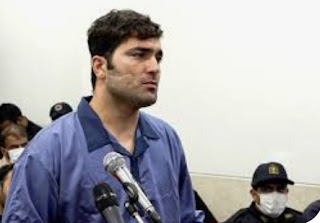Saudi beheadings soar in 2015 with one person beheaded every two days on average
WARNING: Graphic content. Forced to their knees and beheaded by an executioner wielding a sword — and it has nothing to do with IS.
FORCED to their knees with their hands tied behind their backs and just moments later beheaded by an executioner wielding a sword — that was the fate of at least one person, on average, every two days in Saudi Arabia in 2015.
Beheadings last year reached their highest level in the kingdom in 20 years, according to human rights groups that monitor the death penalty worldwide.
Related: Woman Kidn*pped From Her House and Hung Her Half N*ked As a Warning To Their Enemies
And that’s not including the 47 people killed in Saturday’s executions, which have plunged the Middle East into further turmoil as Iran vows to exact “divine revenge” after protesters stormed the Saudi Embassy in Tehran.
Human Rights Watch Middle East researcher Adam Coolge said Saudi Arabia executed 158 people in total in 2015 compared to 90 the year before.
Related: Body Of Tribal Girl Student Found Hanging In School Premises.
Catherine Higham, a caseworker for Reprieve, which works against the death penalty worldwide, said her organisation documented 157 executions in the kingdom.
Saudi Arabia carries out most executions through beheading, sometimes in public with crowds gathered to watch the spectacle.
Saudi Arabia does not release annual tallies, though it does announce individual executions, including those of foreign nationals, in state media throughout the year.
Amnesty said Saudi Arabia had exceeded its highest level of executions since 1995, when 192 executions were recorded.
Saudi law allows for execution in cases of murder, drug offences and rape.Though seldom carried out, the death penalty also applies to adultery, apostasy and witchcraft.
The kingdom’s representative to the UN Human Rights Council, Bandar al-Aiban, said in an address in Geneva in March that capital punishment applies “only (to) those who commit heinous crimes that threaten security.”
Coinciding with the rise in executions was the number of people executed for nonlethal offences that judges have wide discretion to rule on, particularly for drug-related crimes.
Rights group Amnesty International said in November that at least 63 people had been executed since the start of the year for drug-related offences. That figure made for at least 40 per cent of the total number of executions in 2015, compared to less than four per cent for drug-related executions in 2010.
But while most crimes, including premeditated murder, may carry fixed punishments under Saudi Arabia’s interpretation of the Islamic law, or Shariah, drug-related offences are considered “ta’zir”, meaning neither the crime nor the punishment is defined in Islam.
Discretionary judgments for “ta’zir” crimes have led to arbitrary rulings with contentious outcomes.
In a lengthy report issued in August, Amnesty International noted the case of Lafi al-Shammari, a Saudi national with no previous criminal record who was executed in mid-2015 for drug trafficking. The person arrested with him and charged with the same offences received a 10-year prison sentence, despite having prior arrests related to drug trafficking.
Human Rights Watch found that of the first 100 prisoners executed in 2015, 56 had been based on judicial discretion and not for crimes for which Islamic law mandates a specific death penalty punishment.
Sharia scholars hold vastly different views on the application of the death penalty, particularly for cases of “ta’zir.”
Delphine Lourtau, research director at Cornell Law School’s Death Penalty Worldwide, said there are Shariah law experts “whose views are that procedural safeguards surrounding capital punishment are so stringent that they make death penalty almost virtually impossible.”
She said in Saudi Arabia, defendants are not provided defence lawyers and in numerous cases of South Asians arrested for drug trafficking, they are not provided translators in court hearings. She said there are also questions “over the degree of influence the executive has on trial outcomes” when it comes to cases where Shiite activists are sentenced to death.
Emory Law professor and Shariah scholar Abdullahi An-Naim said because there is an “inherent infallibility in court systems,” no judicial system can claim to enforce an immutable, infallible form of Shariah.
There is a gap between what Islam is and what Islam is as understood by human beings,” he said. “Sharia was never intended to be coercively applied by the state.”
Similar to how the US Constitution is seen as a living document with interpretations that have expanded over the years, more so is the Koran, which serves as a cornerstone of Shariah, he said. The other half to Shariah is the judgments carried out by the Prophet Muhammad.
Virtually anything else becomes an interpretation of Shariah and not Shariah itself, An-Naim said.
Thanks for reading, leave your thought in the comment section below.
Read more on our News Channel














Comments
Post a Comment